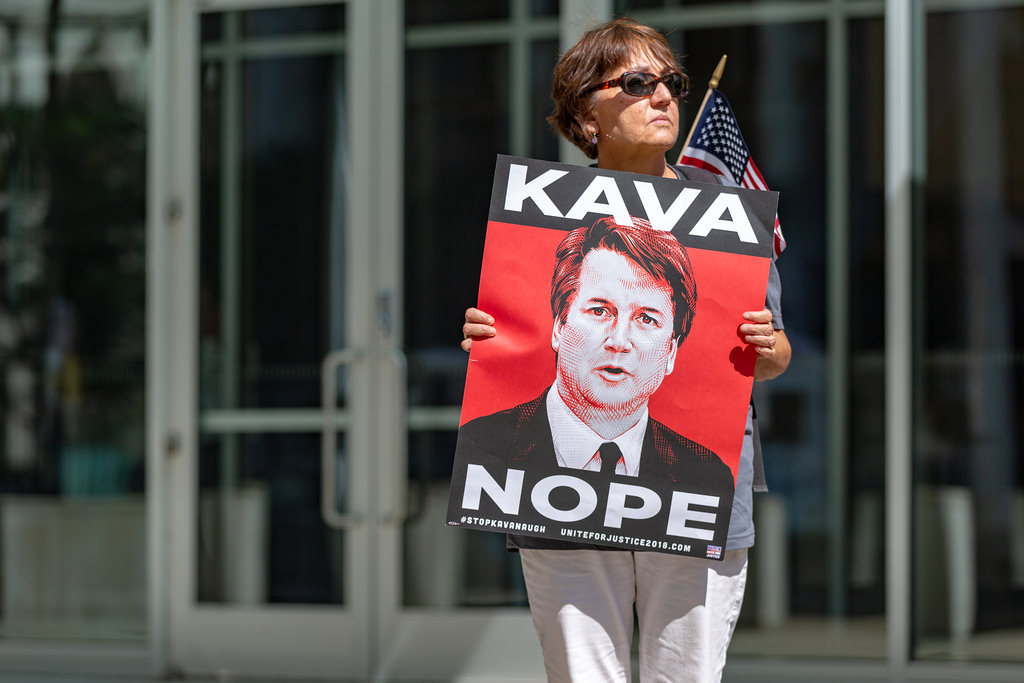Early this summer, President Donald Trump’s nomination to the Supreme Court seemed likely to go through, with Republicans in control of the Senate. However, in the past month Judge Brett Kavanaugh, Trump’s pick, has been accused of sexual assault, plunging his nomination into scandal and uncertainty.
This past June, Justice Anthony Kennedy resigned from the Supreme Court of the United States after serving for 30 years. To fill the vacancy, President Trump nominated Kavanaugh, a U.S. Circuit Judge of the U.S. Court of Appeals for the District of Columbia Circuit.
In February 2016, when Justice Antonin Scalia died, former President Barack Obama chose Merrick Garland, chief judge on the U.S. Court of Appeals for the District of Columbia Circuit, as his Supreme Court nomination. Garland had long been considered a prospect for the Supreme Court. However, Senate Majority Leader Mitch McConnell declared that any appointment by the sitting president was “null and void,” according to NPR, and that the next Supreme Court Justice should be chosen by the next president, who was to be elected later that year in November. President Obama never managed to have Garland confirmed by the Republican-controlled Senate. President Trump, after taking office, nominated Neil Gorsuch who was confirmed as Associate Justice of the Supreme Court and took the oath of office on April 10, 2017.
Many Senate Democrats are frustrated that Mitch McConnell actively worked against Obama’s nomination and stalled for months but has rushed through Kavanaugh’s nomination, despite Democratic senators requesting an archive of documents from Kavanaugh’s time in the Bush administration, where he served as both White House counsel and staff secretary.
Despite Senate Democrats putting up a fight, it was expected that Kavanaugh’s nomination would be relatively smooth. But that changed on Sept. 12.
Earlier this summer, Christine Blasey Ford sent a letter to Senator Dianne Feinstein, the ranking Democrat on the Senate Judiciary Committee, describing an incident concerning Kavanaugh. In the letter, she wrote that she expected her name to be kept confidential. She also contacted the Washington Post, but struggled with coming forward publicly, fearing what it would do to her and her family. Ford is a psychology professor at Palo Alto University and teaches in consortium with Stanford University. However, news of the letter to Feinstein leaked and the story quickly snowballed as The New York Times and the New Yorker reported on the letter but did not reveal Ford’s name. Ford worried her story would be twisted and decided to come forward. On Sept. 16 the Washington Post published an article naming Ford and detailing her claims against Kavanaugh. Ford claims Kavanaugh sexually assaulted her when he was 17 years old and she was 15 years old at a party in suburban Maryland. The Post described how in 2012 and 2013, Ford went to therapy during which she discussed the incident and called it a “rape attempt.” Ford also took a lie detector test, on the advice of her lawyer Debra Katz, and provided the results to the Post. According to the Post, the results “concluded that Ford was being truthful when she said a statement summarizing her allegations was accurate.”
On Sept. 18 Senate Judiciary Committee Chairman Chuck Grassley cancelled a meeting for Thursday, Sept. 20, where committee members were expected to hold a vote on Kavanaugh’s nomination. According to CNBC, the meeting has not been given a new time or date, as of now. Democrats are calling for a FBI investigation into the matter before Kavanaugh’s confirmation hearing should proceed.
“The sexual assault allegations that have been brought against [Kavanaugh] show how misogynistic, and honestly how straight up awful he is,” third-year and Acting President for Generation Action Alexandra Barbat said in an email interview. “I and the rest of Planned Parenthood support Christine Blasey Ford. Rapists should not sit on the highest court in the country. Having him on the Supreme Court would be so dangerous, and would prove how little Congress cares about people’s lives.”
Meanwhile, many are drawing comparisons to Anita Hill’s testimony in 1991 during the nomination hearing of Clarence Thomas, now Supreme Court Justice. Hill came forward and accused Thomas of sexual harassment. Hill is calling for the Judiciary Committee to do better in handling Ford’s allegations than it did hers in 1991. She believes the committee was partial and biased.
Stakes are high as the midterm elections are fast approaching. Republicans are eager to confirm Kavanaugh before November, fearing that possible Democratic victories in the Senate would tip the majority. Democrats are eager to postpone the hearing as much as possible.
According to NPR, Ford is set to justify in front of the Judiciary Committee concerning her allegations on Thursday, Sept. 27.
In breaking news, on Sunday, Sept. 24, national news organizations reported that Senate Democrats are also investigating a sexual misconduct allegation against Kavanaugh by Deborah Ramirez, a former classmate of Kavanaugh’s at Yale University.
Information gathered from npr.org, cnbc.com, nytimes.com, washingtonpost.com and newyorker.com.

